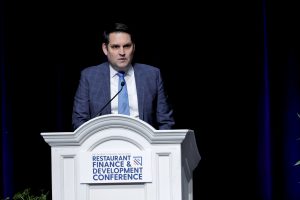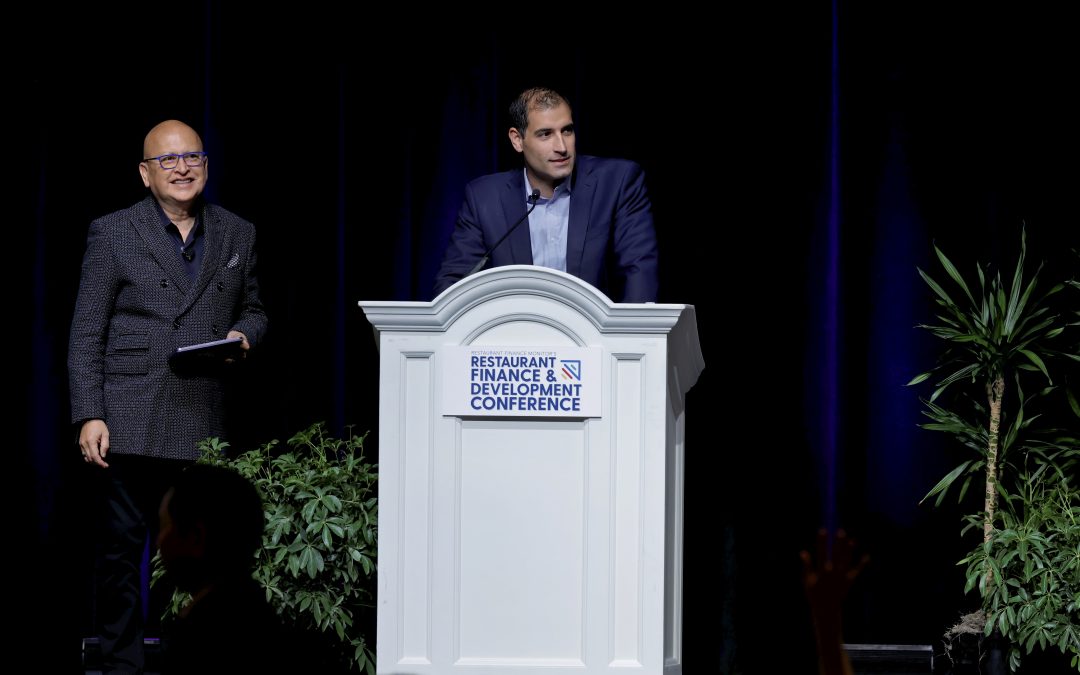Stagnant foot traffic, an uneven post-COVID recovery, the rise of automation, and a broad-based consumer drive for experiences over things were the key themes at this year’s Restaurant Finance & Development Conference in Las Vegas.
Produced by Food On Demand parent company Franchise Times Corp., RFDC is held every November and is one of the largest, longest-tenured events in the North American restaurant industry.
During the second day’s Around the Industry portion, characterized by 7-minute presentations moderated by Chaos Strategist Fred LeFranc, nearly a dozen speakers delved into the trends they see impacting the industry today—as well as those likely to have an impact in the months and years to come.
A few speakers stood out for their perspective on what this means for delivery and restaurant operations of all kinds.

R.J. Hottovy of Placer.ai
R.J. Hottovy from Placer.ai, a former Morningstar analyst, shared a number of uses of customer geolocation data, which can be used to extrapolate countless consumer trends still in play.
Going through year-over-year visits by restaurant category, Hottovy outlined how casual and fine dining establishments continue impacting industry-wide closure rates. Overlaying that customer location data with other categories, like value-focused grocery stores, dollar stores and warehouse clubs, Placer.ai’s numbers show a big migration from certain trade areas, even as urban centers finally show signs of a broad-based traffic recovery.
Zeroing in on Chipotle, its findings also show that visits in markets between 50,000 and 200,000 residents are performing especially well, sometimes as much as 20 percent higher than suburban or strictly urban markets.
Hottovy added that so-called eater-tainment establishments like Dave & Busters and Topgolf are some of the brand leaders in this post-pandemic environment, with the category running 10 to 15 percent higher than casual dining.
KeyBanc’s Eric Gonzales delved into whether U.S. consumers have had enough pizza after the pandemic provided a huge boost to the delivery-friendly category.
While much of the recent growth across pizza was soaked up by Domino’s, as growth in the category slows. He pointed to competitive “intrusion” from third-party delivery before Domino’s starts delivering through Uber Eats as part of its new, exclusive partnership.
Malcolm Knapp focused on extreme weather after a year of record-setting weather disasters across the globe, and how these shifts will “be much worse in 10 years than it is today … this has been the summer from climate hell all across the planet.”
Looking ahead at long-range climate forecasting, Knapp said that this year’s relatively hot, dry season will soon feel like a mild year as conditions deteriorate in general.
He cited a United Nations report showing that more people than ever are living under especially precarious conditions, including from heat waves.
“Thirty percent of the global population is exposed to deadly climate conditions for at least 20 days per year,” which was vividly highlighted by Phoenix experiencing 31 straight days at or above 110 degrees Fahrenheit.
With insurance prices rising and some carriers writing off entire markets, like Florida, Knapp argued that insurance shifts alone will have a significant impact on residents and business owners in markets where insurers have decided the risk outlines the potential profits.
Bank of America’s Gregg Nabhan presented an outlook for capital markets in 2024 after sudden shocks to the banking system through many investor-backed categories into a tailspin in the beginning of 2023.

Lauren Silberman of Deutsche Bank
Citing inflation, aggressive Federal Reserve policy, multiple ground wars, he noted that the U.S. economy continues defying gravity from our “very, very privileged position,” but added that “the world is about to change.”
Looking ahead, Nabhan said his team expects returns to be “more subdued” in the months to come now that the “era of free money” is over for the foreseeable future.
“We are one headline away from something potentially very disastrous” for the IPO and U.S. markets in general.
In particular, he highlighted turmoil in the Middle East as likely to spike oil prices at some time in the near future, with impacts spreading across the economy—whether or not these conflicts expand and potentially rope Iran into the equation.
Stay tuned to FOD and our sister publication Franchise Times for additional coverage from this year’s RFDC in the coming weeks.


